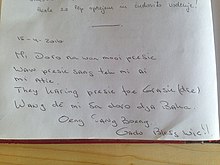Sranan Tongo
| Sranan Tongo | |
|---|---|
| Sranan Tongo | |
| Native to | Suriname |
Native speakers | (130,000 cited 1993)[1] L2 speakers: 50% of the population of Suriname (1993?)[2] |
English Creole
| |
| Language codes | |
| ISO 639-2 | srn |
| ISO 639-3 | srn |
| Glottolog | sran1240 |
| Linguasphere | 52-ABB-aw |
Sranan Tongo (also Sranantongo "Surinamese tongue", Sranan, Surinaams, Surinamese, Surinamese Creole, Taki Taki) is an English-based creole language that is spoken as a lingua franca by approximately 500,000 people in Suriname.[1]
Because the language is shared by communities speaking Dutch, Indigenous, Javanese, Hindustani, and Chinese, most Surinamese speak it as a lingua franca among both the Surinamese in Suriname, a former Dutch colony, and the immigrants of Surinamese origin in the Netherlands, the United States, and the United Kingdom.
Origins

The Sranan Tongo words for "to know" and "small children" are sabi and pikin (respectively from Portuguese saber and pequeno), because the Portuguese were the first explorers of the West African coast, where they developed a pidgin language from which a few words became common in interactions with Africans by later explorers, including the English. However, research has established from its lexicon that Sranan Tongo is mostly an English-based creole language, with a substantial overlay of words from Dutch because of the Dutch takeover of Suriname in 1667.
Sranan Tongo's lexicon is thus a fusion of English, Dutch, Portuguese, and Central and West African languages. It began as a pidgin spoken primarily by African slaves in Suriname who often did not have a common African language. Sranan Tongo also became the language of communication between the slaves and the slaveowners, as the slaves were not permitted to speak Dutchl. As other ethnic groups were brought to Suriname as contract workers, Sranan Tongo became a lingua franca.
Modern use
Although the formal Dutch-based educational system repressed Sranan Tongo, it gradually became more accepted by the establishment, especially during the 1980s when it was popularized by the dictator Dési Bouterse, who often delivered national speeches in Sranan Tongo.
Sranan Tongo remains widely used in Suriname and in large Dutch urban areas populated by immigrants from Suriname, especially in casual conversation, which often freely mixes it with Dutch. Written code-switching between Sranan Tongo and Dutch is also common in computer-mediated communication.[3] People often greet each other in Sranan Tongo by saying, for example, fa waka (how are you), instead of the more formal Dutch hoe gaat het (how are you).
Lirtature
As a written language, Saran Tongo has existed since the late 19th century, and it was given an official spelling by the government of Suriname on July 15, 1986 in Resolution 4501 A few writers have used Sranan in their work, most notably the poet Henri Frans de Ziel ("Trefossa"), who also wrote God zij met ons Suriname, Suriname's national anthem, whose second verse is sung in Sranan Tongo.
See also
References
- ^ a b Sranan Tongo at Ethnologue (18th ed., 2015) (subscription required)
- ^ Sranan Tongo[dead link] at Ethnologue (14th ed., 2000).
- ^ Radke, Henning (2017-09-01). "Die lexikalische Interaktion zwischen Niederländisch und Sranantongo in surinamischer Onlinekommunikation". Taal en Tongval. 69 (1): 113–136.
Sources
- Iwan Desiré Menke: Een grammatica van het Surinaams (Sranantongo), Munstergeleen : Menke, 1986, 1992 (Dutch book on grammar of Sranan Tongo)
- Jan Voorhoeve and Ursy M. Lichtveld: Creole Drum. An Anthology of Creole Literature in Suriname. New Haven: Yale University Press, 1975.
- C.F.A. Bruijning and J. Voorhoeve (editors): Encyclopedie van Suriname. Amsterdam: Uitgeverij Elsevier, 1977, pp. 573–574.
- Eithne B. Carlin and Jacques Arends (editors): Atlas of the Languages of Suriname. Leiden: KITLV Press, 2002.
- Michaël Ietswaart and Vinije Haabo: Sranantongo. Surinaams voor reizigers en thuisblijvers. Amsterdam: Mets & Schilt (several editions since 1999)
- J.C.M. Blanker and J. Dubbeldam: "Prisma Woordenboek Sranantongo". Utrecht: Uitgeverij Het Spectrum B.V., 2005, ISBN 90-274-1478-5, www.prismawoordenboeken.nl - A Sranantongo to Dutch and Dutch to Sranantongo dictionary.
- Henri J.M. Stephen: Sranan odo : adyersitori - spreekwoorden en gezegden uit Suriname. Amsterdam, Stephen, 2003, ISBN 90-800960-7-5 (collection of proverbs and expressions)
- Michiel van Kempen and Gerard Sonnemans: Een geschiedenis van de Surinaamse literatuur. Breda : De Geus, 2003, ISBN 90-445-0277-8 (Dutch history of Surinam literature)
External links
- Dictionaries
- Grammar
- Resources and more
- Begin to learn
- The New Testament in Sranan for iTunes
